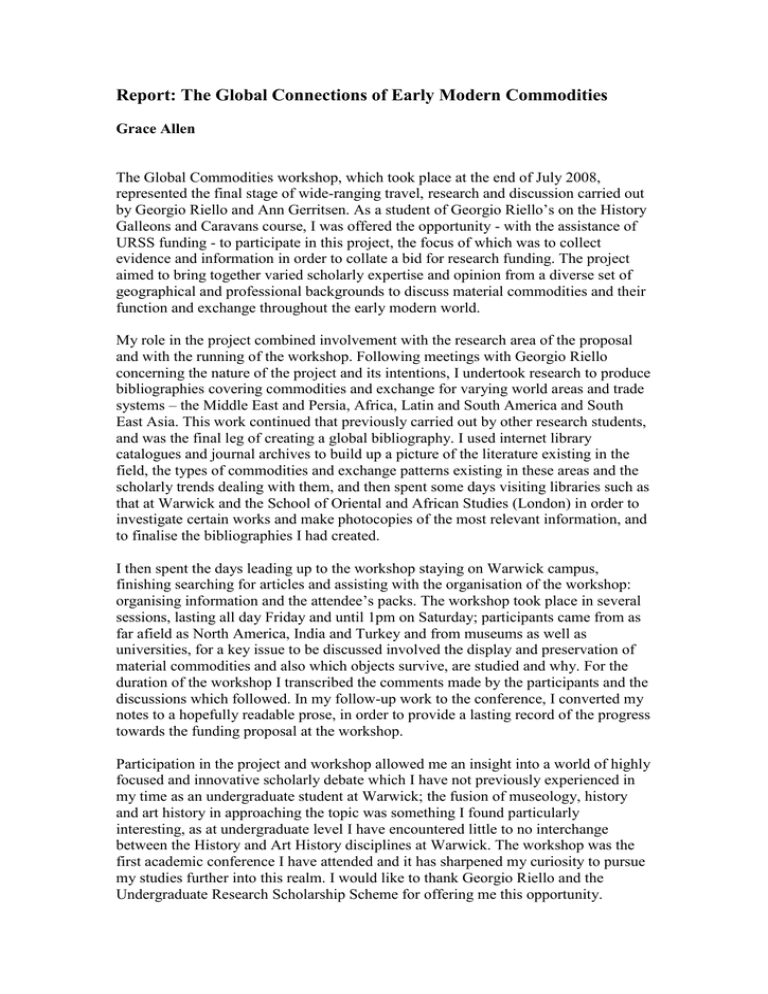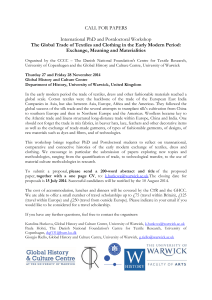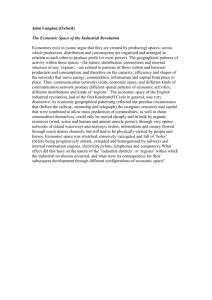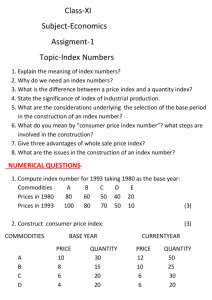Report: The Global Connections of Early Modern Commodities
advertisement

Report: The Global Connections of Early Modern Commodities Grace Allen The Global Commodities workshop, which took place at the end of July 2008, represented the final stage of wide-ranging travel, research and discussion carried out by Georgio Riello and Ann Gerritsen. As a student of Georgio Riello’s on the History Galleons and Caravans course, I was offered the opportunity - with the assistance of URSS funding - to participate in this project, the focus of which was to collect evidence and information in order to collate a bid for research funding. The project aimed to bring together varied scholarly expertise and opinion from a diverse set of geographical and professional backgrounds to discuss material commodities and their function and exchange throughout the early modern world. My role in the project combined involvement with the research area of the proposal and with the running of the workshop. Following meetings with Georgio Riello concerning the nature of the project and its intentions, I undertook research to produce bibliographies covering commodities and exchange for varying world areas and trade systems – the Middle East and Persia, Africa, Latin and South America and South East Asia. This work continued that previously carried out by other research students, and was the final leg of creating a global bibliography. I used internet library catalogues and journal archives to build up a picture of the literature existing in the field, the types of commodities and exchange patterns existing in these areas and the scholarly trends dealing with them, and then spent some days visiting libraries such as that at Warwick and the School of Oriental and African Studies (London) in order to investigate certain works and make photocopies of the most relevant information, and to finalise the bibliographies I had created. I then spent the days leading up to the workshop staying on Warwick campus, finishing searching for articles and assisting with the organisation of the workshop: organising information and the attendee’s packs. The workshop took place in several sessions, lasting all day Friday and until 1pm on Saturday; participants came from as far afield as North America, India and Turkey and from museums as well as universities, for a key issue to be discussed involved the display and preservation of material commodities and also which objects survive, are studied and why. For the duration of the workshop I transcribed the comments made by the participants and the discussions which followed. In my follow-up work to the conference, I converted my notes to a hopefully readable prose, in order to provide a lasting record of the progress towards the funding proposal at the workshop. Participation in the project and workshop allowed me an insight into a world of highly focused and innovative scholarly debate which I have not previously experienced in my time as an undergraduate student at Warwick; the fusion of museology, history and art history in approaching the topic was something I found particularly interesting, as at undergraduate level I have encountered little to no interchange between the History and Art History disciplines at Warwick. The workshop was the first academic conference I have attended and it has sharpened my curiosity to pursue my studies further into this realm. I would like to thank Georgio Riello and the Undergraduate Research Scholarship Scheme for offering me this opportunity.




